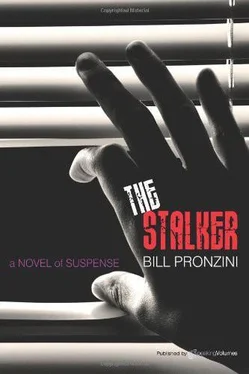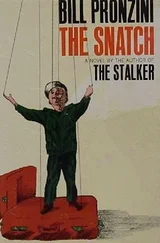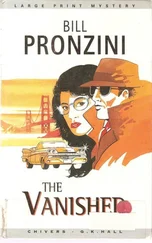Bill Pronzini - The Stalker
Здесь есть возможность читать онлайн «Bill Pronzini - The Stalker» весь текст электронной книги совершенно бесплатно (целиком полную версию без сокращений). В некоторых случаях можно слушать аудио, скачать через торрент в формате fb2 и присутствует краткое содержание. Жанр: Старинная литература, на английском языке. Описание произведения, (предисловие) а так же отзывы посетителей доступны на портале библиотеки ЛибКат.
- Название:The Stalker
- Автор:
- Жанр:
- Год:неизвестен
- ISBN:нет данных
- Рейтинг книги:4 / 5. Голосов: 1
-
Избранное:Добавить в избранное
- Отзывы:
-
Ваша оценка:
- 80
- 1
- 2
- 3
- 4
- 5
The Stalker: краткое содержание, описание и аннотация
Предлагаем к чтению аннотацию, описание, краткое содержание или предисловие (зависит от того, что написал сам автор книги «The Stalker»). Если вы не нашли необходимую информацию о книге — напишите в комментариях, мы постараемся отыскать её.
The Stalker — читать онлайн бесплатно полную книгу (весь текст) целиком
Ниже представлен текст книги, разбитый по страницам. Система сохранения места последней прочитанной страницы, позволяет с удобством читать онлайн бесплатно книгу «The Stalker», без необходимости каждый раз заново искать на чём Вы остановились. Поставьте закладку, и сможете в любой момент перейти на страницу, на которой закончили чтение.
Интервал:
Закладка:
She sank onto the chair again and stared at the door without seeing it. Armed robbery, vicious attack, a man possibly paralyzed for life— and he had come home to her with enough money to marry, and to buy the big white house on Bodega Flat and the salmon fishing troller he had always dreamed of owning. Good man, kind man. Killer? Thief? No, no—but the time was right: March, 1959, and the place was right: Granite City, Illinois, just a few miles from Bellevue Air Force Station, and something had changed him, something had slowly taken him apart inside with a million cancerous teeth. Had that something been guilt? Was that the reason all this money—what was left after the house and the boat and the luxuries and the incidentals—had been allowed to lie dormant in the safe deposit box all these years? Had he been unable any longer to spend the blood spoils when the guilt became too strong? Wouldn’t his complicity in this terrible crime explain why he had never been able to tell her what was troubling him, why he had kept it all bottled up inside him these long past years? Wouldn’t it explain why he had refused to leave Bodega Bay, except when it was absolutely necessary, why he drank so much during the winter months when there wasn’t the fishing to keep him occupied? Wouldn’t it explain—
Why he had died?
God, God! Why had he died? Had his death really been an accident? Or—had it been something else?
Suicide? Had the guilt become too much for him to bear? Had he finally reached the breaking point Sunday night—and thrown himself off that high, fog-shrouded cliff at Goat Rock?
Or—
Murder ?
No, not that, not that! Who would want to murder Jim? Unless ... His partners? The other five men? But why would they want him dead? Why after eleven years? Who were they? Who—?
The two men at the funeral.
The two men sitting in the very last row at the mortuary!
Trina sat up very straight on the chair, and it was as if her body were encased in a block of glacier ice. The two men, one dark and Latin-appearing, the other tall and muscular. Tall and muscular. Greenish-brown eyes. Stopping to look toward her in the family alcove, soft-spoken—“Mrs. Conradin ... I’m sorry, Mrs. Conradin”—Bandit Number One.
Steven Kilduff, San Francisco .
She stood up convulsively. The police. She had to go to the police. She had to tell them—
Tell them Jim Conradin had been a thief?
Tell them the man she loved had been a vicious criminal?
Hurt his family, hurt her family, destroy his name?
But she had to. If he had been murdered, his killers couldn’t be allowed to go unpunished. And even if his death had been accidental, or suicidal, she couldn’t live with the knowledge of his crime—she knew that—she couldn’t live with it for one single day as he lived with it for eleven long years. She had to go to the police, she had to.
Jim, I have to, she thought, and she picked up the newspaper section from the floor and put it into the safe deposit box and swung the hinged lid closed. Jim, I have to, and may God have mercy on your soul and on mine for what I have to do; there’s no other way.
She picked up the box—frightened, trembling, crying—and ran out of the cubicle.
11
Late Wednesday afternoon.
The phone rang at 4:55.
Kilduff came out of the kitchen where he had been making coffee and caught up the receiver on the second ring. There was the taste of chalk in his mouth. “Hello?”
“Steve? Larry.”
“Yes?” tensely.
“I’ve got something.”
Kilduff let breath spray almost inaudibly between his teeth. “Go ahead.”
“Not on the phone.”
“Christ, Larry—”
“Later,” Drexel said. “Tonight.”
“Where are you now?”
“Chicago. I’m booked onto the seven-thirty flight to San Francisco.”
“Are you coming here?”
“No. My place. San Amaron Road in Los Gatos, Number 547. Can you find it?”
“I’ll find it,” Kilduff said. “What time?”
“The plane gets in at ten, Coast time. Give me better than an hour to get home. Say eleven-thirty.”
“All fright.”
“Listen, Steve, is everything okay with you?”
“What do you mean?”
“You’ve been sticking close to your apartment?”
“Yes.”
“You haven’t talked to anyone?”
“Who would I talk to?”
“What about your wife?”
“I told you about her,” Kilduff said. “She’s gone.”
“Okay, just stay cool.”
“Sure.”
“I’ll see you tonight.”
“Larry, what is it you’ve got?”
“Tonight,” Drexel said. “Make sure you’re there, Steve.”
“Larry—” Kilduff began, but he was talking to a dead line.
He put the phone down and returned to the kitchen and looked at the coffee maker. The same painful constriction he had known on Saturday night was back in his chest, and his breathing had a nasal, labored quality. Well, what now? Had Drexel located Helgerman somehow? He’d sounded uptight on the phone, almost apprehensive, and that wasn’t like him—always steady, always in command. Something was bugging him, bugging him heavy . . . Christ, Kilduff thought, suppose he’s already found Helgerman? Suppose for some inexplicable reason Helgerman went home after he killed Conradin, and Drexel found him and . . .
Suppose he’s already killed him!
I’d be an accessory before and after the fact, and wouldn’t that make me equally as guilty as Drexel in the eyes of the law? Wouldn’t that mean the gas chamber for me, too? The gas chamber—no, there weren’t any more executions in California, were there? They only gave you life imprisonment now, life in a cage—what does it matter, anyway, because one is no more preferable than the other and there’s no Statute of Limitations on the crime of murder—The doorbell chimed.
Kilduff started, and a cold slimy thing attached itself parasitically between his shoulder blades. He sucked breath into his lungs like a gaffed fish. But then he rubbed a hand across his face and thought: Take it easy, now, just take it easy. No jumping at shadows, no reading malice into everyday sounds. Easy, son, easy. Hell, it was probably Mrs. Yarborough, the manager. He hadn’t paid the rent for the month yet. Sure, Mrs. Yarborough. He went out to the foyer and pulled the door open.
Two men stood in the hallway outside. One was tall and thin, in his early thirties, with sandy hair immaculately combed and expressionless brown eyes and a chin that came to a long V-point. He wore a neat gray suit and a gray and white striped tie and a pale yellow button down shirt with silver teardrop cuff links. The other man was shorter, older by ten years, but of the same leanness. He had a narrow, protracted nose that curved oddly, like a fishhook. He was dressed in a dark brown shiny-trousered suit, and in his left hand he carried an old brown hat with a torn sweatband.
The sandy-haired one said, “Mr. Steven Kilduff?” in a soft, almost mellifluous voice.
Kilduff looked at them and knew instantly who they were. He had an insane desire to fling the door closed, to turn and run, flee, run, run, but there was no place for him to go. The knot in his chest tightened until his lungs seemed to be rejecting the entrance of oxygen, and he tried to control the panic that was rising like a flood tide within him. It’s something else, he thought, a traffic violation, something else; but he was lying to himself and he knew it. He put out his hand involuntarily against the door jamb, and washed saliva around in his mouth, and forced words past the dryness of his throat. “Yes, what is it?”
“My name is Commac,” the sandy-haired one said. He brought his left hand up, and nestled against the palm was a leather case with a shield pinned inside. “Inspector Neal Commac, San Francisco police. This is my partner, Inspector Flagg.”
Читать дальшеИнтервал:
Закладка:
Похожие книги на «The Stalker»
Представляем Вашему вниманию похожие книги на «The Stalker» списком для выбора. Мы отобрали схожую по названию и смыслу литературу в надежде предоставить читателям больше вариантов отыскать новые, интересные, ещё непрочитанные произведения.
Обсуждение, отзывы о книге «The Stalker» и просто собственные мнения читателей. Оставьте ваши комментарии, напишите, что Вы думаете о произведении, его смысле или главных героях. Укажите что конкретно понравилось, а что нет, и почему Вы так считаете.












